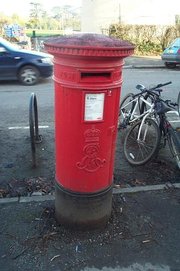Royal Mail
|
|
Royal_Mail_logo.gif
Company logo
Royal Mail is the national postal service in the United Kingdom. Historically, the Royal Mail was a government department, but it became a nationalised industry in 1969. The Royal Mail was responsible for the telephone service in the UK until BT was demerged in 1981.
As of 2005, Royal Mail Group plc is a public limited company with around 212,000 employees. Notwithstanding the prevailing political atmosphere in the 1980s and 1990s, which lead to the privatisation of former publicly-owned business sectors such as The Stationery Office, British Gas and British Telecom, the core of the Post Office remains in public ownership, with the company being wholly owned by the British Government.
Royal Mail remains responsible for the universal mail collection and delivery service in the UK. Letters are deposited in a post box or taken to a post office, but daily deliveries are made (subject to weather conditions) to addresses throughout the UK, from Shetland to Cornwall, and the same prices are charged however remote the sender or recipient. Royal Mail also operates the national network of local post offices through Post Office Limited.
| Contents |
History
The Royal Mail traces its history back to 1516, when Henry VIII established a "Master of the Posts". The Royal Mail service was first made available to the public by Charles I in 1635, with postage was paid by the recipient, and the General Post Office (GPO) was officially established by Charles II in 1660. The first adhesive stamp (the Penny Black) was introduced in 1840, meaning that was postage was henceforth paid by the sender. Royal Mail introduced operated telegraph services from 1870 and telephone services from 1912.
The National Giro Bank was introduced in 1968, and in 1969 Royal Mail was converted from a government department, the General Post Office, to a nationalised industry. The office of Postmaster General was abolished in 1974. The British Telecommunications Act 1981 split the Post Office Corporation into two nationalised entities, the Post Office and British Telecommunications (later British Telecom or BT); BT was later privatised, but the Post Office remained in public ownership. Girobank was sold in 1990.
In 2000, The Post Office renamed itself Consignia. However, the change proved to be highly unpopular with both the public and even the organisation's own employees, with the Communication Workers' Union boycotting the name. In 2002, the organisation reverted to the name Royal Mail as Royal Mail Group plc with operating divisions of Royal Mail and Parcelforce dealing with the letter and parcel services respectively, and with Post Office Limited as a wholly owned subsidiary which manages the nationwide network of post office branches as retail outlets.
The British Government set up a postal regulator, Postcomm, and offered licences to private companies to deliver mail. Historically, many government benefits and state retirement pensions were paid in cash through the post office network and post offices acted as local branches of Girobank. However, in recent years, an increasing proportion of benefit and pension payments have been made direct to bank accounts. As the activities of Royal Mail have reduced, so the network of post office has contracted, much to the consternation of local communities which have come to rely on their services.
PostOfficeBox.jpg
Timeline
- 1516: Royal Mail established by Henry VIII under Master of the Posts.
- July 31, 1635: Royal Mail service first made available to the public by Charles I. Postage was paid by the recipient.
- 1654: Oliver Cromwell grants UK monopoly to "Office of Postage".
- 1657: Fixed postal rates introduced.
- 1660: *General Post Office (GPO) officially established by Charles II.
- 1661: First use of date stamp. First Postmaster General appointed.
- 1784: First mail coach (between Bristol and London).
- 1793: First uniformed delivery staff. Post Office Investigation Branch formed.
- 1830: First mail train (on Manchester & Liverpool Railway).
- 1840: First adhesive stamp (the Penny Black).
- 1853: First post boxes erected in mainland Britain.
- 1854: Rowland Hill becomes Secretary to the Post Office.
- 1858: Ten London postal districts established.
- 1870: Post Office begins telegraph service.
- 1880: First use of bicycles to deliver mail.
- 1881: Postal order introduced.
- 1883: Parcel post begins.
- 1894: First picture postcards.
- 1912: Post Office opens national telephone service.
- 1917: London postal districts divided into numbered zones.
- 1919: First international air mail service.
- 1927: The London Post Office Underground Railway is opened.
- 1968: Two-class postal system introduced. National Giro bank opens.
- 1969: Post Office changes from government department to nationalised industry.
- 1974: Postcodes extended over all UK.
- 1979: Prestel videotex system launched
- 1981: Telecommunications services transferred to British Telecom.
- 1986: Royal Mail separated into letters, parcels and post office businesses.
- 1990: Girobank sold to the Alliance & Leicester Building Society.
- 1997: Royal Mail's association with London railway stations comes to an end.
- 2003: The London Post Office Underground Railway is closed.
- 2004: Abandonment, to much protest, of the second daily postal delivery.

See also
External links
- Bath Postal Museum (http://www.bathpostalmuseum.org/)
- The British Postal Museum & Archive (http://www.postalheritage.org.uk/)
- Royal Mail Group plc (http://www.royalmailgroup.com)
- Royal Mail Group - About us: Facts (http://www.royalmailgroup.com/aboutus/aboutus8.asp)fr:Royal Mail
